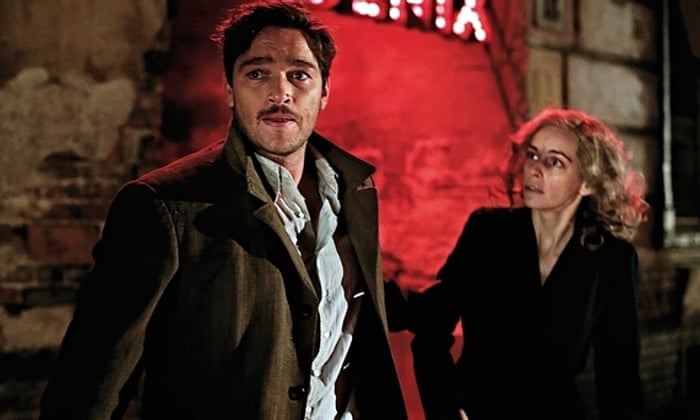As bound up in issues of personal and national identity as its heroine is in bandages, the German film Phoenix repeatedly sets us to pondering one question: who are these people? Writer-director Christian Petzold (Yella, Barbara) hails from what's been labelled the Berlin School, a group of filmmakers who've come to pick away at some of the same social concerns tackled with an austere formal rigour in the New German Cinema of the 1960s and 70s; with as many years having passed between then and now as there were separating those first-wave filmmakers from the rise of Nazism, these concerns can now be viewed through the prism of genre.
Distance can be a liberating thing. Phoenix, concerning one woman's quest to rebuild her life in the immediate wake of WW2, operates in the key of romantic melodrama, complete with songs, lavish costumes and a narrative that time and again approaches the heightened preposterousness of its avowed inspiration Vertigo: it's one of those plots about a plot that has to have its heroine - Nelly (Nina Hoss), emerging from the camps nursing scars from the plastic surgery incurred after she took a bullet to her face - utter the line "But nobody will buy it!" in the hope of abating any doubts or fears that might be gathering in the stalls at that point.
There are gaps in the heroine's skull, then, and also in her backstory: we know from an early stage that she was a singer of some kind before the war, and that she was married to a pianist before events intervened. What's less clear is the state of play in this relationship, for hubby was reportedly arrested and himself carted away - perhaps to provide information? - shortly before a bomb flattened their home and killed Nelly's remaining family. Our heroine sets out to find him amid the rubble, and eventually does so in the nightclub of the title - which, far from some thriving Weimar cabaret, appears more like a cramped room, an attempt to make merry amid desperately reduced circumstances: with little need for pianists, Johnny (Ronald Zehrfeld) has been reduced to washing dishes, oblivious to the fact he even still has a wife.
Petzold isn't averse to deploying the cliches of movies about identity - there's a lot of Nelly looking into mirrors, or fragments of mirrors - yet what becomes increasingly crucial is that his heroine is a performer of sorts. Seeing the arrival in his midst of a dead ringer for his lost love, Johnny enlists the lookalike to play Nelly as part of a get-rich-quick scam; rather than declare her actual identity, she chooses to play along. Here, Phoenix demands a leap of audience faith, although Petzold has laid the psychological foundations for Nelly's decision so precisely that you may just buy it. It's clear, for one, that at least a small part of our heroine is still in shellshock (and we'd do well to remember that psychology in wartime is very different from its peacetime equivalent).
Yet we also suspect that Nelly might just be glad for the attention: that, after weeks or months of being cast as a literally faceless woman, the part of "Nelly" - invited to step down off a train framed by plumes of smoke, as though she were Sarah Bernhardt playing Anna Karenina - is exactly the comeback role for which she's been looking. Bonuses include not having to try and recount the more than faintly unbelievable truth that the fates have assigned to her, and an opportunity that brings her close to being the loving, loyal wife she's always wanted to be; what she hasn't factored in, however, is that things have changed in Johnny as they have in the outside world. Soon this makeshift attempt at reunification is itself no more than a pile of rubble.
Petzold gives us plenty of thematic heft, although he remains a little too dourly academic to conjure much in the way of thrills or sparks: the ending is both an airtight summation of everything he has to say about the incompleteness of Germany at this time, and still in some way unsatisfying. He does, however, work very closely and rigorously with his small cast: the suavely bullying Zehrfeld exemplifying the type of guy a girl might go to extremes for, revealing notes of vulnerability only at the last, while Hoss - as elsewhere, proving one of the most compelling actresses in modern world cinema - very deftly sketches a woman trying to pull herself together, only to find some of the pieces have changed beyond all recognition, while others have simply vanished without a trace.
Phoenix is available on DVD through Soda from Monday.

No comments:
Post a Comment